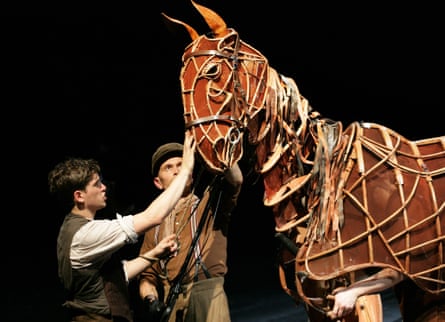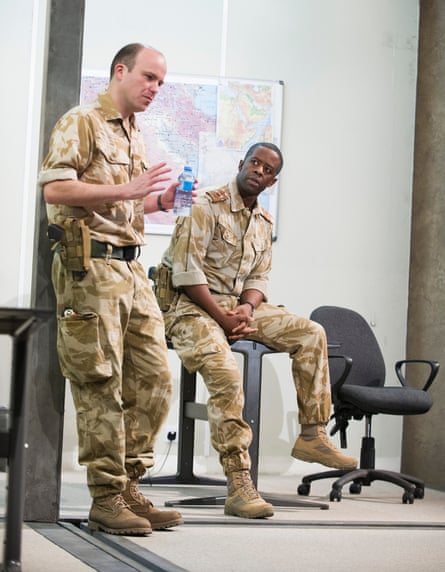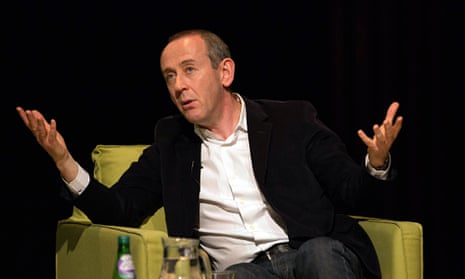When Nicholas Hytner took over the National Theatre in 2003, it felt like an institution settling into comfortable middle-age. After making some critical remarks about the pre-Hytner regime, I remember being taken to lunch by the then executive director. I told her I didn’t quite know what the National stood for any more. “Funny you should say that,” she replied. “We ask ourselves that question, too.”
Hytner didn’t mess around in seeking to answer it. Right from his opening press conference, he made it clear his mission was to define what the words “national” and “theatre” meant in 21st-century Britain. Any National worthy of its name obviously had to do more, through play-choice and casting, to embody the idea of diversity. Since Hytner’s first season included new plays by Kwame Kwei-Armah and Roy Williams, and his final one has boasted two epic works on Asian themes, Behind the Beautiful Forevers and Dara, he has clearly dented the idea that the South Bank complex is the exclusive property of the white middle class.

More controversial has been Hytner’s attempt to redefine what we mean by “theatre”. His point was that dance theatre, music theatre, devised theatre and physical theatre were now challenging the supremacy of the solo-authored play. Hence, over the years, Hytner’s National has played host to a variety of companies including Complicite, Kneehigh, Improbable Theatre and DV8. The results have been artistically mixed. But it says a lot about the changing times that two of the biggest popular hits of the Hytner years have been shows in which text is only one feature of a total theatrical experience: War Horse and The Curious Incident of the Dog in the Night-Time.
Hytner also made two structural changes that will leave a massive legacy. The first is NT Live, which initially transmitted plays from the South Bank to 80 screens in the UK. The number is now around 500, with many more abroad. It’s the most revolutionary thing to have happened in theatre in my lifetime and I’m not sure we have yet grasped all its implications. Clearly, it gives virtually everyone access to the National’s work and thereby reinforces the case for subsidy. NT Live has also become a facility that broadcasts work from other houses, including the Young Vic and the Donmar. The question yet to be faced is this: if it is cheaper, easier, more comfortable, and sometimes even aesthetically preferable, to watch plays transmitted on a screen, will the day come when the number of people going to a live performance starts to dwindle? Already, I see that a decline in audiences at New York’s Metropolitan Opera is being blamed on the success of their live broadcasts.
One way to get people in, of course, is to make theatre affordable, which Hytner has done through the £15 ticket scheme (sponsored by Travelex). As long as I can remember, people have been talking about the issue: over two decades ago, I heard Peter Brook, in a talk at the Donmar, say: “The future of the theatre is cheap seats.” Hytner, partly through cutting production costs and changeover-times for expensive sets, has made it happen. Where the National led, others have automatically followed.
But if Hytner has restored the National’s sense of purpose, it is mainly through the work – more particularly, through the idea that the National should not leave comment on the big issues of the day to newspapers and TV. So we’ve had plays about Iraq (Stuff Happens), the financial crisis (The Power of Yes), climate change (Greenland), immigration (England People Very Nice) and press and police corruption (Great Britain). Clearly, the National is not alone in seeing itself as a forum for debate: two Royal Court shows about environmental catastrophe – Ten Billion and 2071 – knocked spots off the muddled and incoherent Greenland. But I don’t know of any comparable theatre on the continent, certainly not the Comédie Française, that feels a need to tackle the crises affecting our daily lives.
Given the overall success of the Hytner years, what have been the areas of failure? A colleague suggested he has not done enough to promote women dramatists in the way that his successor, Rufus Norris, palpably plans to do. I’m not sure the charge is entirely fair. Rebecca Lenkiewicz’s Her Naked Skin, Moira Buffini’s Welcome to Thebes and Alecky Blythe’s London Road were all seen in the Olivier; Tena Stivicic’s 3 Winters has just closed in the Lyttelton; and Lucy Prebble, Lucy Kirkwood and Tanya Ronder all had work in smaller spaces. Women directors – including Marianne Elliott, Katie Mitchell, Thea Sharrock, Polly Findlay, Melly Still, Josie Rourke, Nadia Fall and Emma Rice – have also done enough at the National to disprove the idea that the Hytner regime has been exclusively blokey.

A more serious accusation is that the classic repertory has not been sufficiently refreshed. We’ve had some notable Shakespeares (Henry V, Othello, Hamlet, King Lear, Timon of Athens), an occasional Jacobean or Restoration comedy (The Alchemist, The Man of Mode) and, thanks largely to director Howard Davies, some outstanding Russian plays (Philistines, The White Guard). Hytner even learned to overcome his aversion to Shaw. But, when I put it to Hytner last year that the classic repertory had not had enough attention, he said: “You’d be amazed at the number of planning meetings I’ve chaired where I’ve said, ‘Will no one do The School for Scandal?’” If directors have to be bullied or browbeaten into doing Sheridan, that suggests a cultural problem that extends far beyond the South Bank.
But no national theatre can ever meet all expectations. In a time of national crisis, Hytner hasn’t just kept the show on the road – he has expanded the possibilities. He has managed to retain the loyalty of an older generation of dramatists, including Alan Bennett, Tom Stoppard, David Hare and Howard Brenton, while embracing their successors such as Mike Bartlett, David Eldridge and Rebecca Lenkiewicz. He has got away from the kind of stereotyped thinking about the musical that, within a single year under the previous regime, gave us revivals of My Fair Lady and South Pacific; instead, he has provided shows as richly diverse as London Road, Caroline or Change, and Fela!. And, in purely physical terms, Hytner leaves behind an enlarged space with the newly opened Clore Learning Centre.
I’m not claiming he’s St Nicholas. I know some older supporters who crave more classics. I also know some disgruntled actors who feel the talent pool has not been sufficiently widened. But set aside the grumbles and one can say the Hytner years have been exciting and provocative. In fact, I’d go even further. I’d say Hytner has done more than anyone since Peter Brook and Peter Hall in the 1960s and 70s to change the face of British theatre. His advocacy of cheap seats and of live broadcasts will, I believe, be viewed by future historians as a major cultural turning point: the moment the National became a theatre for the nation and all the pious talk about reaching out to a new audience became a living reality.

Comments (…)
Sign in or create your Guardian account to join the discussion